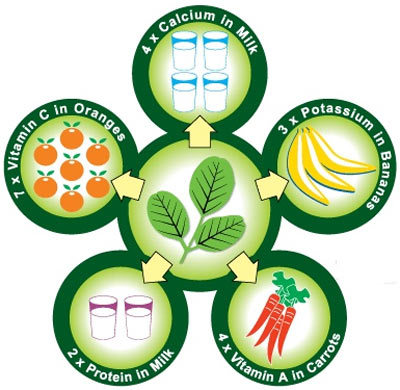The most amazing fact about moringa is that it is a storehouse of nutrients and medicinal chemicals. The various parts of this plant are rich in vitamin A, vitamin C, calcium, potassium, iron and protein. It contains a plethora of phytonutrients, eight essential amino acids and other powerful disease fighting antioxidants. According to the Ayurveda, moringa comprises of around 539 compounds capable of preventing 300 diseases. Moringa contains more than 90 nutrients and 46 different antioxidants which make it a powerhouse of nutrition. The table given below provides a gist of the nutritional value of this wonderful plant.
| Nutrient | Dried leaves | Fresh leaves |
| Vitamin A | 6.78 mg | 18.9 mg |
| Thiamin (B1) | 0.06 mg | 2.64 mg |
| Riboflavin (B2) | 0.05 mg | 20.5 mg |
| Niacin (B3) | 0.8 mg | 8.2 mg |
| Vitamin C | 220 mg | 17.3 mg |
| Calcium | 440 mg | 2,003 mg |
| Calories | 92 cal | 205 cal |
| Carbohydrates | 12.5 g | 38.2 g |
| Copper | 0.07 mg | 0.57 mg |
| Fat | 1.70 g | 2.3 g |
| Fiber | 0.90 g | 19.2 g |
| Iron | 0.85 mg | 28.2 mg |
| Magnesium | 42 mg | 368 mg |
| Phosphorus | 70 mg | 204 mg |
| Potassium | 259 mg | 1,324 mg |
| Protein | 6.70 g | 27.1g |
| Zinc | 0.16 mg | 3.29 mg |
Moringa leaves are a storehouse of nutrients. They contain seven times more potassium than bananas and twice the amount of protein as that contained in milk. Milk is considered to be an important source of calcium, but moringa leaves contain four times more calcium than milk. They contain four times more vitamin A or beta carotene than carrots. Moringa powder which is prepared by grinding the dried leaves of moringa contain seven times more vitamin C than oranges, 25 times the amount of iron in spinach, 36 times the amount of magnesium in eggs, 50 times more vitamin B3 than peanuts and 50 times more vitamin B2 than bananas.
Moringa leaves compared to common foods
Values per 100gm. edible portion
| Nutrient | Moringa Leaves | Other Foods |
| Vitamin A | 6780 mcg | Carrots: 1890 mcg |
| Vitamin C | 220 mg | Oranges: 30 mg |
| Calcium | 440 mg | Cow’s milk: 120 mg |
| Potassium | 259 mg | Bananas: 88 mg |
| Protein | 6.7 gm | Cow’s milk: 3.2 gm |
In addition to these nutrients, moringa leaves contains all the essential amino acids needed for growth and development of the body.
Amino Acid Content of Moringa Leaves:
All values are per 100 grams of edible portion.
Fresh Leaves Dried Leaves.
| Nutrient | Dried leaves | Fresh leaves |
| Arginine | 406.6 mg | 1,325 mg |
| Histidine | 149.8 mg | 613 mg |
| Isoleucine | 299.6 mg | 825 mg |
| Leucine | 492.2 mg | 1,950 mg |
| Lysine | 342.4 mg | 1,325 mg |
| Methionine | 117.7 mg | 350 mg |
| Phenylalinine | 310.3 mg | 1,388 mg |
| Threonine | 117.7 mg | 1,188 mg |
| Tryptophan | 107 mg | 425 mg |
| Valine | 374.5 mg | 1,063 mg |
Looking at the benefits of Moringa , it is imperative to include it in our diets and daily regime. With its antioxidant, purifying and detox properties it is the skin’s best friend. Always do a patch test before applying any new product on your skin like ben oil and the paste of moringa leaves. Moringa is an easy and delicious way to reap the benefits.

No comments:
Post a Comment